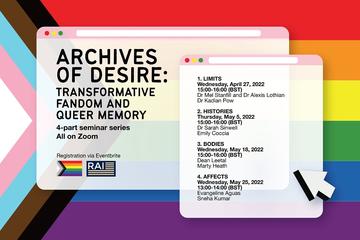Archives of Desire: Transformative Fandom and Queer Memory – 4. Affects
Evangeline Aguas
Sneha Kumar

Archives of Desire: Transformative Fandom and Queer Memory
4-part seminar series, All on Zoom
Registration via Eventbrite
This free seminar series is premised on the idea that online fan spaces archive queer desires.
Transformative fandom (where fans adapt pre-existing, copyrighted media properties to create their own artworks, stories and videos) has been theorised as:
a) innately memorialising – recording how individual fans feel about the media they consume, and
b) structurally queer – troubling gender and sexuality norms.
This series asks what happens when we view fan works, and the digital spaces in which they circulate, as records of contemporary LGBTQIA+ cultural memory.
- Who is included or excluded in this type of memorialising?
- How does race, gender identity and privilege shape fan archives and the histories they document?
- What kinds of feelings do these repositories preserve, generate or share?
- How do they relate to other forms of queer remembering?
Join our incredibly line-up of fan scholars this Trinity term, as we explore these ‘Archives of Desire’! All events free to attend and open to the public.
Sneha Kumar
Sneha Kumar is a PhD student in Film and Moving Image Studies at Concordia University. Their research interests lie at the intersections of femslash fandoms, platforms and feelings, particularly looking at how fan platforms often become sites for the archiving of queer feeling. They also have a vested interest in expanding the meanings of fan, fandom, and fan platform. In their dissertation, they aim to explore queer embodiments within the spaces, places and expressions of transnational femslash fandoms, specifically queer Indian women fandoms of the web series. Their work has been published in the Journal of Transformative Works and Cultures and RENDER. You will often find them wearing some shade of blue.
Carmilla fandom as a lesbian community of feeling
This paper considers the ways in which the contemporary lesbian web series, Carmilla (2014-2016), both creates and sustains an online queer fandom on YouTube, Archive of Our Own (AO3) and Tumblr that functions much like an archive of lesbian feelings and affinities. Two scholars that are central to how I think about and analyse this online archive are Ann Cvetkovich and Alexander Cho. Cvetkovich describes queer performance as central to the creation of lesbian publics in how it brings bodies together. Building on her understanding of the queer as performative, I argue that femslash fan fiction - Carmilla fan fiction in particular - is also a site of performance that creates communities through the process of being written, read and discussed. Moreover, in keeping with the idea of transformative fandom as memorializing, I propose that femslash fan fiction on AO3 can also be understood as an archive of lesbian feelings that make relationships between women available to memory. The Carmilla fandom on Tumblr on the other hand can be thought of as an affinity space, in the vein of Cho, who describes affinity spaces as those in which people bond over shared interests.
However, as is the nature of most archives, power and privilege come to determine whose feelings get recorded. In thinking through questions of exclusion from the Carmilla fandom on the basis of race, I engage with the scholarship of Mel Stanfill, Rukmini Pande, stitch and Samira Nadkarni. Affect scholar, Teresa Brennan, writes of “othering” as a process by which negative affects are dumped onto marginalised groups and toward that end I will not only explore how the positive affects of belonging, happiness and nostalgia circulate within and among the platforms of YouTube, Tumblr and AO3 but also those of isolation and silencing.
Evangeline Aguas
Evangeline Aguas (she/her) is a PhD candidate at the University of Technology Sydney. With a background in film and television production, her interdisciplinary research aims to combine the fields of queer theory, digital media, and fan studies with creative practice. Her current research project is an ethnographic study on how queer female and genderqueer fans experience queer temporalities, capturing abstraction and lived experience through documentary form. Evangeline's research is supported by an Australian Government Research Training Program Scholarship.
Queer Interruptions: Disseminating Queer Ephemera and Melancholia in an “Archive of Feelings”
As conceptions of the “archive” are renegotiated in a continually shifting digital landscape, it remains pertinent to examine the affordances of digital, democratised archives, particularly for traditionally disempowered and marginalised communities. Drawing on the work of Ann Cvetkovich, I discuss my online documentary, Queer Interruptions (https://queerinterruptions.com), as an “archive of feelings” (2003, p. 7). Focusing on queer female and genderqueer fans, the work explores how these fans inhabit queer time—how they experience a sense of delay, backwardness, and asynchrony—thereby acting as a digital repository of the feelings, ephemera, and textures of queer lives. As my own contribution to the mass media archive, the website illustrates the fannish archive impulse where fans perform multiple roles as participants, documentarians, archivists, and activists. Through the work’s capacity to record and disseminate queer affect, it emblematises the multiple temporalities of archives, where the past is brought into the present not in nostalgic reminiscence, but as a lingering in queer, racialised melancholia. As a fannish archive of feelings, Queer Interruptions captures the ephemeral and intangible elements of queer fan experience, queering the digital space and recuperating the histories of not only marginalised queers, but also those of stigmatised fans on the periphery.



